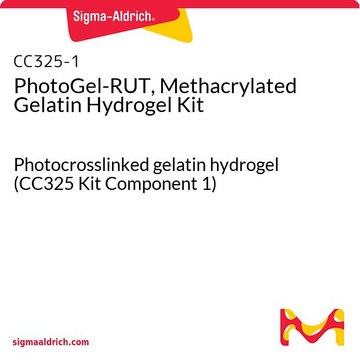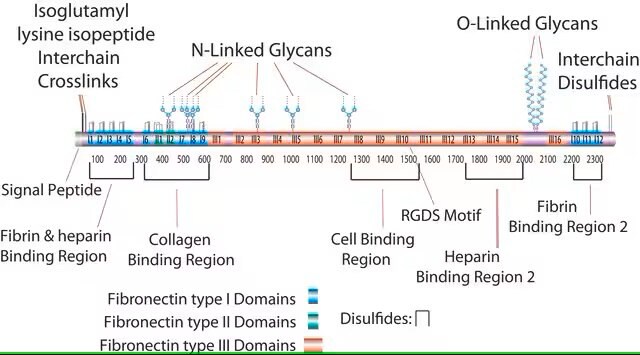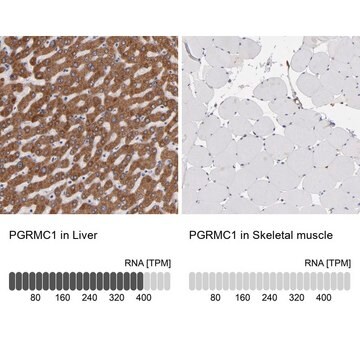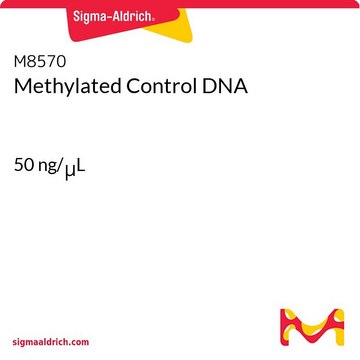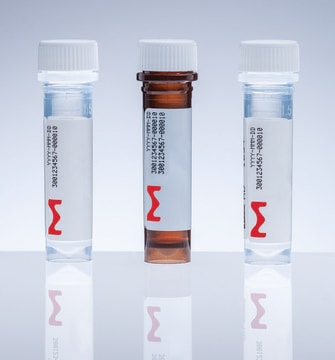935786
Shear-thinning gelatin-based photocrosslinkable bioink

suitable for extrusion-based 3D bioprinting
Synonyme(s) :
EASYGEL INX
Se connecterpour consulter vos tarifs contractuels et ceux de votre entreprise/organisme
About This Item
Code UNSPSC :
12352201
Produits recommandés
Niveau de qualité
Forme
(transparent gel)
Viscosité
0.1-1 Pa.s (high shear)
200-2500 Pa.s low (shear)
Résistance du gel
(Storage modulus after UV crosslinking (kPa) 2-6)
Description générale
The shear-thinning gelatin-based bioink is a extracellular matrix (ECM)- mimicking ink that provides all the benefits of gelatin with the addition of shear thinning behaviour, thereby allowing easy printing at 37°C.
Based on gelatin derived from natural collagen, this bioink has been modified with photocrosslinkable functional groups which enables unpreedneted printing efficiency of a scaffold that resembes the natural ECM and has exptionally high cell viabilities. The shear-thinning gelatin-based bioink combines all the benefits of conventional gelatin or GelMA with the improved printability thanks to its shear thinning behavior. It can be printed at 37°C in the presence or absence of cells, and overcomes the narrow processing range limitations associated with printing conventional GelMA based bioinks. After printing, the material can be photocrosslinked, resunting in a physiologically stable hydrogel.
Processing:
At high shear rates, this bioink exhibits a low viscotiy which allows easy injection from the printing nozzle, At low shear rates, it has a high viscosity, which is required for shape retention after deposition. This is favorable for extrusion-based 3D bioprinters as the ink should easily be injected through the printing nozzle and the post-injetion flow should be minimized to prevent structural deformation. These properties are very rarely seen in conventional gelatin-based ink, giving this bioink an advantage over traditional bioinks.
Based on gelatin derived from natural collagen, this bioink has been modified with photocrosslinkable functional groups which enables unpreedneted printing efficiency of a scaffold that resembes the natural ECM and has exptionally high cell viabilities. The shear-thinning gelatin-based bioink combines all the benefits of conventional gelatin or GelMA with the improved printability thanks to its shear thinning behavior. It can be printed at 37°C in the presence or absence of cells, and overcomes the narrow processing range limitations associated with printing conventional GelMA based bioinks. After printing, the material can be photocrosslinked, resunting in a physiologically stable hydrogel.
Processing:
At high shear rates, this bioink exhibits a low viscotiy which allows easy injection from the printing nozzle, At low shear rates, it has a high viscosity, which is required for shape retention after deposition. This is favorable for extrusion-based 3D bioprinters as the ink should easily be injected through the printing nozzle and the post-injetion flow should be minimized to prevent structural deformation. These properties are very rarely seen in conventional gelatin-based ink, giving this bioink an advantage over traditional bioinks.
Application
Applications: :
3D bioprinting
Tissue engineering
In vitro modeling
3D bioprinting
Tissue engineering
In vitro modeling
Caractéristiques et avantages
Features and Benefits:
- Easy printing - Shear thinning behavior enables easy deposition at 37°C
- Biodegradability - Enables cellular remodeling of the printed matrix
- Easy handling - Delivered in a ready-to-use cartridge - UV curable
- Efficient UV-based crosslinking
- Reproducibility - Strict quality control
Cell interactive - Material is biocompatible mimics natural ECM envrionment
- Easy printing - Shear thinning behavior enables easy deposition at 37°C
- Biodegradability - Enables cellular remodeling of the printed matrix
- Easy handling - Delivered in a ready-to-use cartridge - UV curable
- Efficient UV-based crosslinking
- Reproducibility - Strict quality control
Cell interactive - Material is biocompatible mimics natural ECM envrionment
Code de la classe de stockage
10 - Combustible liquids
Classe de danger pour l'eau (WGK)
WGK 3
Point d'éclair (°F)
Not applicable
Point d'éclair (°C)
Not applicable
Certificats d'analyse (COA)
Recherchez un Certificats d'analyse (COA) en saisissant le numéro de lot du produit. Les numéros de lot figurent sur l'étiquette du produit après les mots "Lot" ou "Batch".
Déjà en possession de ce produit ?
Retrouvez la documentation relative aux produits que vous avez récemment achetés dans la Bibliothèque de documents.
Notre équipe de scientifiques dispose d'une expérience dans tous les secteurs de la recherche, notamment en sciences de la vie, science des matériaux, synthèse chimique, chromatographie, analyse et dans de nombreux autres domaines..
Contacter notre Service technique
